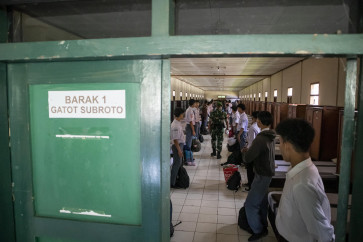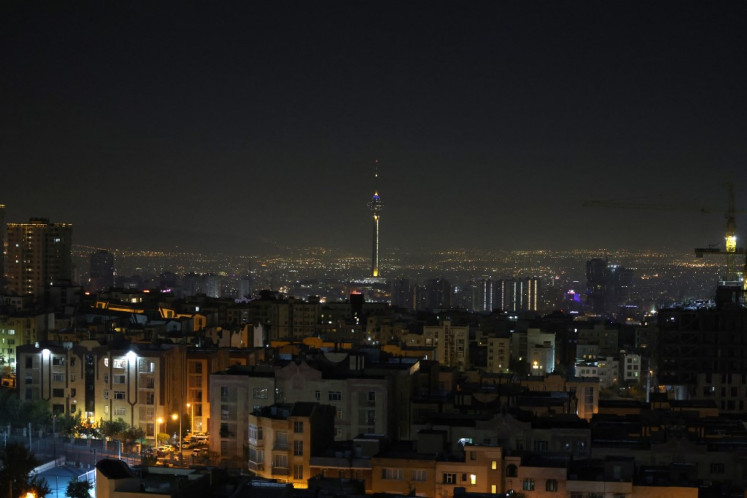Indonesian students abroad debunk lavish lifestyle stereotypes
Studying abroad offers the privilege of seeing the world; however, it often comes with a price, from an ‘invisible’ hard-work ethos to discrimination.
Change text size
Gift Premium Articles
to Anyone

S
tudying abroad offers the privilege of seeing the world, however, it often comes with a price, from an ‘invisible’ hard-work ethos to discrimination.
Studying abroad is more than just aesthetic pictures and the "part-time traveler, full-time student" Instagram bio. Although many people often associate studying abroad with a lavish lifestyle or endless traveling opportunities, for those who are actually doing it, the truth might be far from such assumptions.
"Those popular beliefs that Indonesians abroad live a lavish, extravagant life are based on real-life experiences of many people in the diaspora," said Toar, a linguistic student who resides in Göttingen, Germany, and prefers not to divulge their real name. "But it always depends on the [destination] country."
The 22-year-old first came to the country at 16 to attend a fully-funded summer course in high school. Because they were already familiar with Germany, its language and culture, it seemed only natural for them to move there for university.
Studying in Germany, according to Toar, has plenty of perks, which include tuition-free education, universal health care, jobs with good pay and free transportation.
"It's easy to assume the student life abroad is full of luxury and comfort," said Toar, who identifies as queer, which makes navigating life abroad "a complicated topic to talk about" in its own ways.

Iga Makainas, a 20-year-old master of business administration graduate from another German university who once studied in China, said that while she had never faced terrible prejudice in the country, she believed she never truly belonged there.
"When [some people] see others who look different, they are either excited to get to know you or judge you as an outcast," Iga said, adding that her studies in Germany were "way more challenging compared to China or Indonesia" because "people are more critical".
Meanwhile, for Martha Chiquita, who went to London for her master's at a relatively young age after earning her bachelor's in Singapore, life in the United Kingdom "isn't as put together" as people see in the media.
She didn't document her struggles during her studies, leading some people to assume that all she experienced was leisure.
"I get told off by a lot of people who said I only watched soccer and had fun in museums, while in fact, [they] don't know the number of all-nighters I pulled to graduate on time," she said.
Prejudice and discrimination
Despite calling Germany a second home, sometimes it doesn't seem like one for Toar — as they have repeatedly experienced racial discrimination.
"I don't [even] know where to start. I have been called names, thrown racial slurs at by strangers, [even] racially profiled by the police," said Toar.
They declined to provide further details regarding the latter.
On the other hand, those experiences opened Toar's eyes to crucial "social justice issues that minorities and other marginalized communities experience in [Western] society" that are unfortunately often ignored.
Having studied and lived in two countries, Martha's experiences were just as complicated. She struggled to connect with her peers in Singapore, but it was more complex in the UK as she had to fight ageism, among other things.
She started her master of arts specializing in cultural and creative industries in Goldsmiths, the University of London, at 19, which prompted some of her classmates to fall into stereotypes and call her too young to be where she was.
"It was kind of difficult to be able to prove to them that age is really just a number."
She would also occasionally receive "death stares" while minding her own business in public simply because her skin color doesn't "fit into the society’s common standards".
"These little things sound odd to be upset about, but trust me, it gets under your skin and affects you so much mentally," Martha remarked.

Winson Toyip, a branch director of Indonesia's international educational consultancy firm SUN Education, rarely receives discrimination reports from his clients but acknowledges that such incidents exist.
When asked what leads certain groups of people to treat the international students relatively less fairly, fear, he believes, is the most common factor.
"In [students'] destination countries, there are many layers of social strata. They may encounter people who are conservative, and they fear people from other countries may steal their jobs," he explained.
The good news is, said Winston, most of his firm's "partner universities have antidiscrimination policies that students must understand", which help students navigate their new lives.
Pandemic and the shifts it brings
Amid the COVID-19 pandemic, some students might long to fly to their home countries to be closer to family or to travel to other places. Toar, however, has no desire to do so, especially now more than ever. Toar recalled the time they visited France with another Indonesian.
"People stared at us and avoided us by staying away from us or covering their nose and mouth as soon as they saw us," they said. "I was already aware of the discrimination East and Southeast Asian individuals have to face due to the growing anti-Asian sentiment in the West triggered by the supposed origin of the virus."
Martha tried to keep herself occupied with small but significant daily routines, such as talking to her loved ones.
"I'm pretty much a homebody, so I don't think there's much I did to navigate myself during the outbreak. I just try to stay alive by staying inside and learning recipes to cook as a distraction from my thesis," she said, adding that she finished her thesis during the outbreak in 2020.

Silver linings
Regardless of the hardships they faced, Toar and Martha are eternally grateful for having the privilege to study abroad — one they admit not many people have.
"At the end of the day, what really stays with you is the life lessons," said Martha, detailing the little things that made her stay abroad memorable. "The place where you interned, restaurants you visited with your friends, encounters with cool strangers and the conversation with the dates you had — I wouldn't trade all that for anything else."
For Toar, the chosen family they have found while living in Germany is their silver lining.
"The heartwarming welcome and openness and love that I have witnessed from and been given by so many kind people here make me feel at home," they said.
Toar also credits the country's affordability, promising job market, as well as the independence they gained that made their stay over the years mostly pleasant.
"But of course, it is not without struggles and, without trying to glorify labor, also hard work."
ohmg









